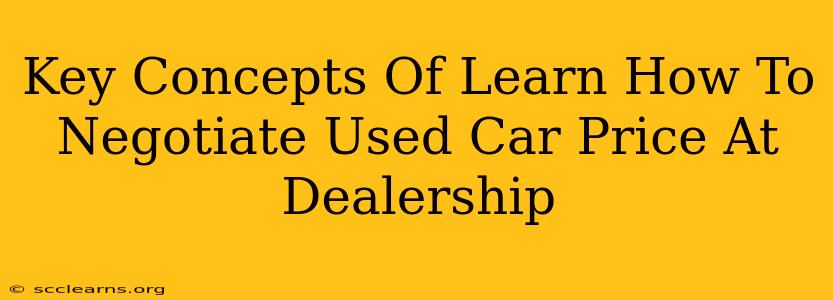Buying a used car can be a thrilling experience, but the negotiation process can feel daunting. Knowing the key concepts and strategies beforehand is crucial to getting the best possible price. This guide will equip you with the knowledge to navigate the dealership and drive away feeling confident in your purchase.
Research is Your Best Friend
Before you even step foot on a dealership lot, thorough research is paramount. This isn't just about finding the car you want; it's about understanding its value.
1. Kelley Blue Book (KBB) and Edmunds: These websites provide detailed pricing information based on the car's year, make, model, mileage, condition, and features. Use these resources to determine a fair market price. Don't rely solely on the dealership's listed price.
2. Check for Similar Listings: Search online marketplaces (like Craigslist or Facebook Marketplace) and dealership websites for comparable used cars in your area. This gives you a realistic picture of what others are selling similar vehicles for.
3. Understand the Car's History: Obtain a Vehicle History Report (like Carfax or AutoCheck). This report reveals potential accidents, damage, and maintenance records, which can significantly impact the car's value and your negotiating power. Knowing the history gives you leverage to ask for a lower price if issues are revealed.
Mastering the Art of Negotiation at the Dealership
Armed with your research, you're ready to tackle the dealership. Here are some essential negotiation tactics:
1. Be Prepared to Walk Away: This is arguably the most powerful negotiating tool you have. If you're not comfortable with the price or the dealer's attitude, be willing to leave. This often motivates them to make a better offer.
2. Start Low (But Reasonably): Don't be afraid to offer a price below the asking price, based on your research. Begin with a price that reflects the car's fair market value, considering its condition and any identified issues.
3. Negotiate the Price, Not the Features: Focus your negotiation primarily on the overall price. Adding features later can complicate the process and might not be worth the extra cost.
4. Be Polite but Firm: Maintain a respectful and professional demeanor throughout the negotiation. Clearly state your price expectations and be prepared to justify them with your research.
5. Leverage Competition: If you've found similar cars at other dealerships for a lower price, mention it. This creates a sense of urgency for the dealer to remain competitive.
6. Don't Rush the Process: Take your time, review all the paperwork carefully, and don't feel pressured to make a hasty decision.
Beyond the Sticker Price: Additional Considerations
The final price isn't just about the car's sticker price. Consider these factors:
1. Trade-in Value: If you're trading in your old car, get multiple appraisals before heading to the dealership. This ensures you're getting a fair trade-in value.
2. Financing: If you're financing, shop around for the best interest rates before you go to the dealership. Don't let the dealership dictate your financing terms.
3. Fees and Taxes: Be aware of all additional fees and taxes involved in the purchase. These can significantly add to the total cost.
Conclusion: Drive Away with Confidence
Negotiating the price of a used car can be challenging, but with preparation, knowledge, and the right strategies, you can significantly improve your chances of getting a fair deal. Remember, research is key, and being confident and prepared to walk away are your strongest negotiating tools. Happy car shopping!

